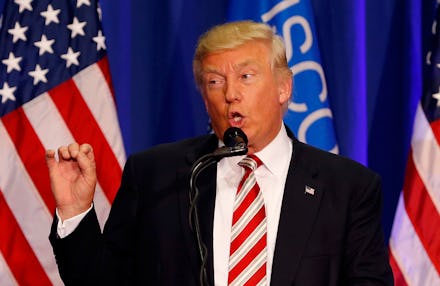Donald Trump Wants to Win Over Black Voters. Here's How He Already Blew His Chance.

Donald Trump made a direct appeal to African-American voters on Tuesday night at a campaign event in Wisconsin, accusing Hillary Clinton and the Democratic Party of "failing" black Americans and pledging that his own presidency would be better for "communities of color" than Clinton's would be.
And while Trump's advisors hailed the speech as a necessary step to help win over African-American support, black activists and pundits — even some who are supportive of Trump's candidacy — said the optics of the event fell short.
Trump delivered the address in West Bend, Wisconsin, an almost entirely white community 40 miles north of Milwaukee. Reporters at the event said almost every attendee in the audience was white, with some vendors outside the rally selling Confederate flags — bad imagery for a speech on race.
"I was pleasantly surprised at how well the speech addressed concerns that I believe most African-Americans have, and I believe that it was delivered with sincerity and that it was a message that I wish more people could hear," said Carol Swain, a professor at Vanderbilt University and an African-American Trump supporter.
"Unfortunately I don't think the people in the black community are necessarily going to be tuning in to hear Donald Trump speak unless they knew he was going to talk specifically on race," Swain added.
Symone Sanders, a Black Lives Matter activist and former national spokeswoman for Sen. Bernie Sanders' presidential campaign, said that Trump has made no real effort to win over black voters.
"Republican operatives told me today on air on CNN, 'Well, you know what, it's on national television.' They're like, 'It's ok, we can give a speech about black people to a white room.' No!" Sanders said. "There was zero effort on the part of the Trump campaign to make sure that there were people of color in the room and that it was genuine and sincere."
Clinton and the black community: For its part, Clinton's campaign pushed back on Trump's attempt to court black voters, saying that his comments that Clinton took black voters for granted was merely a "wild accusation."
In fact, Clinton's nomination came in large part thanks to massive support from the black community, especially black women, who were Clinton's strongest constituency.
And Robby Mook, Clinton's campaign manager, pointed to Clinton's support for criminal justice reform and multiple campaign speeches dedicated to race relations as evidence of her commitment to issues dear to African-American voters.
"Unfortunately, this is typical Donald Trump: peddling something to an audience for the purpose of dividing and confusing people, and nothing could be farther from the truth," Mook told reporters in a press call on Wednesday afternoon.
Still, Clinton hasn't been immune from criticism from African-American activists.
Earlier this year, she was met by Black Lives Matter protesters during a fundraiser South Carolina confronting Clinton over her comments about youth "super-predators" in a 1996 speech on violent crime.
Clinton's complicated history with African-Americans — whom she lost handily to Barack Obama in their 2008 primary battle — led many activists to wonder whether some black voters might look for alternatives to the Democratic Party this year.
But many say Trump's squandered his chance at building support among the black community thanks to both his past remarks on other minority groups — such as his Muslim immigration ban and his attacks on Mexican-Americans — as well as his lack of outreach to black voters.
Sanders pointed to Trump's decision to turn down invitations from groups like the National Association for the Advancement of Colored People and the Urban League as missed opportunities.
Now, months later, Trump's support among black voters is at historic lows, hovering around 1%, according to recent surveys. That lack of support has helped give Hillary Clinton a wide lead in North Carolina and a smaller lead in Georgia, two states with large black populations.
"People basically liked him from what they saw on TV prior to his foray into politics. He had an unusually high name ID in communities of color," Sanders said. "He had an opportunity to at least make a play, and he didn't even make a play."
Missing the mark: Even more than his lack of outreach and the optics of his event in Wisconsin on Tuesday, activists said Trump's message fell short.
They said his idea that immigration has taken jobs away from black communities doesn't bear out with black voters.
DeRay McKesson, a leader of the Black Lives Matter movement who had expressed skepticism of Clinton's candidacy in the past, tweeted that Trump's statement that immigrants take away jobs from the black community was "racist."
Sanders added that Trump's remarks on policing — in which he called for more police to patrol inner cities — runs counter to what black voters are actually feeling. It's something Sanders said Trump would know if he had met with and heard the concerns of the African-American community.
"I'm not sure who he spoke to about that, because if you go into these communities across the country, more police isn't what we need," Sanders said. "We need more accountability. We need better police relations. We need to rethink safety."